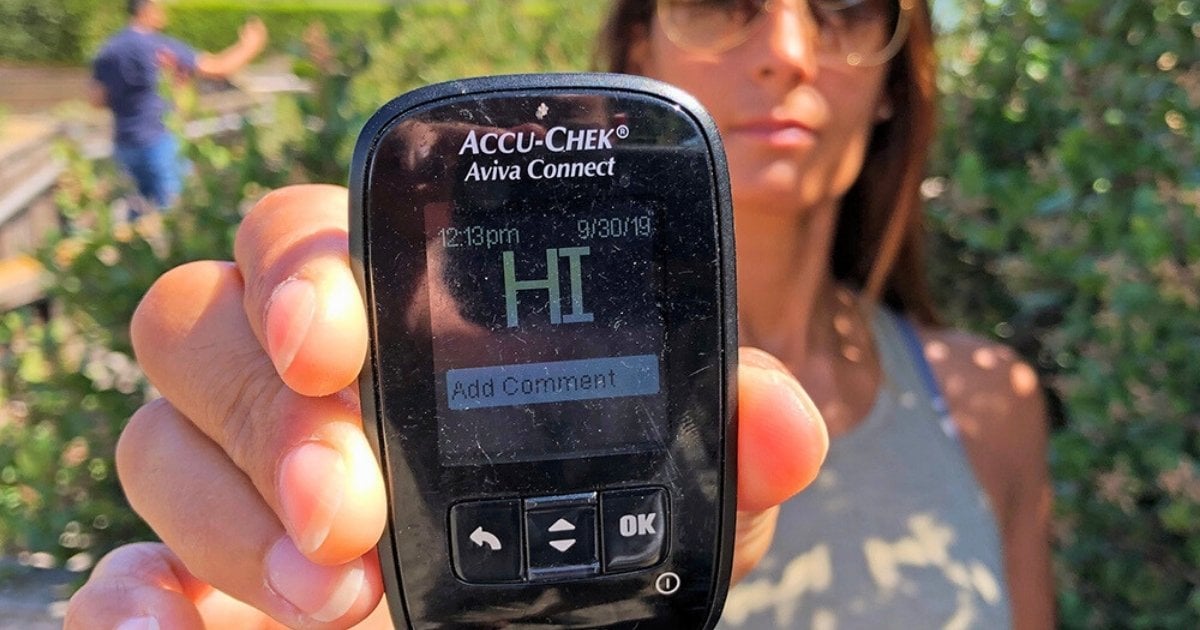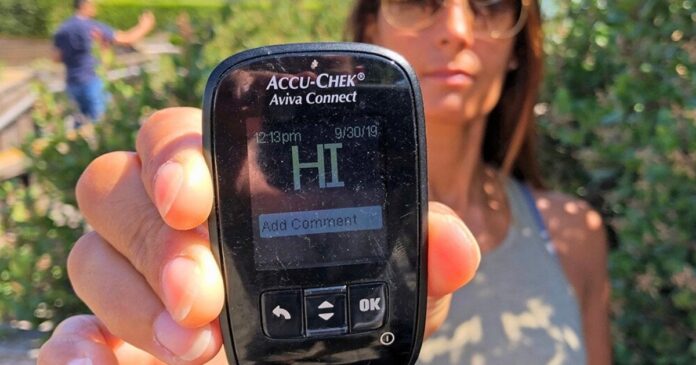When blood sugar levels exceed 400 mg/dL, it’s considered severe hyperglycemia, which requires immediate attention.
This article will tell you what you should do if your blood sugar is over 400 mg/dL.

What is considered severely high blood sugar?
Most people with diabetes will begin to feel symptomatic for high blood sugar between 180-200 mg/dL. If you are insulin-dependent, any blood sugar over 200 mg/dL should be treated with insulin.
If your blood sugar is over 250 mg/dL (13.89 mmol/L), you should take an at-home urine test for ketones to rule out diabetic ketoacidosis (DKA). DKA is a dangerous complication of diabetes that can be fatal if not treated quickly.
Seek medical attention immediately if you’re experiencing a blood sugar higher than 250 mg/dL for several hours, along with mild, moderate, or high ketones, and you’re struggling to get your blood sugar down.
People with diabetes are at risk of falling into a diabetic coma once their blood sugar reaches 600 mg/dL or higher with ketones. Blood sugars that are this high require immediate medical attention, usually in a hospital setting.
What are the causes of high blood sugar?
High blood sugar levels are a direct result of not having enough insulin in your body (cells).
Several factors can contribute to dangerously high blood sugar levels:
- Missed Insulin Doses: Skipping or not taking enough insulin can lead to elevated blood sugar.
- Malfunctioning equipment: An insulin pump or continuous glucose monitor (CGM) malfunction can lead to you missing early warning signals or not getting insulin.
- Illness or Infection: The body’s response to illness can increase blood glucose levels.
- Dietary Choices: Consuming high amounts of carbohydrates without adequate insulin coverage.
- Stress: Emotional or physical stress can trigger hormonal changes that raise blood sugar.
- Medication Interactions: Certain medications and steroids can affect blood glucose control.
What should you do if your blood sugar is over 400 mg/dL?
If your blood sugar is over 400 mg/dL, there are some immediate steps you can take to bring your blood sugar down quickly.
Test your blood sugar again
Sometimes, continuous glucose monitoring (CGM) systems and blood glucose meter readings can be wrong.
Before taking any drastic measures, wash your hands and test your blood sugar again (and if your CGM was reading high, test your blood sugar manually).
Sometimes you may have sugar or another substance on your hands that gave a false high reading the first time, so it is always best to recheck to make sure that your blood sugar is actually high.
Test for ketones
Ketones are a type of chemical that your liver produces to break down fats for energy when there is a lack of insulin in the body to use glucose for energy.
Your body will resort to doing this after prolonged high blood sugar levels, and having ketones can be extremely dangerous.
You can test for ketones with a simple at-home urine or blood test.
If you have ketones, this usually signals that you’ll need to take extra insulin to bring your blood sugar down (most people who develop ketones have type 1, insulin-dependent diabetes).
Talk with your doctor about how your insulin correction factor may change if you have ketones.
If you’re insulin-dependent, take insulin
If you’ve retested your blood sugar and have tested for ketones (whether or not you have them) and you’re insulin-dependent, the next thing to do if your blood sugar is over 400 mg/dL is to take insulin immediately.
You will want to take fast-acting insulin, such as Humalog, Novolog, Fiasp, or Lyumjev, and not long-acting insulin like Lantus or Levemir. This should start to bring your blood sugar down more quickly.
If you’re on an insulin pump and you think you may be having an insulin pump malfunction, take a manual correction injection of insulin and then change your insulin pump site.
Insulin pump site malfunctions can quickly lead to high blood sugar levels, especially if they occur overnight while you’re sleeping.
This is because insulin pumps only use short-acting insulins, so if they stop working, your body quickly runs out of insulin-on-board, unlike if you’re on multiple daily injections with a long-acting dose of insulin.
Drink a glass of water
High blood sugar levels lead to dehydration, which can contribute to diabetic ketoacidosis (DKA). If your blood sugar is high, you may also be urinating more than usual, which makes drinking water even more important.
For these reasons, you must stay hydrated.
Do not resort to drinking soda or juice, as that will only increase your blood sugar levels. Stick with water or a diet drink.
Take a 20-minute walk
After dosing insulin and hydrating, getting even 20 minutes of light exercise can help jump-start your blood sugar to come down.
It is not advised to exercise if you have ketones, however, as high blood sugar levels with ketones cause dehydration, which exercise can exacerbate. This may make your blood sugars even higher.
If your blood sugar does not come down after a few hours, call your doctor
If you’ve tried all of the strategies above but after a few hours your blood sugar has still not come down, call your doctor (especially if you also have mild, moderate, or high ketones and/or are sick).
Your doctor can advise additional strategies to employ. They may even recommend going to the hospital for intravenous fluids and insulin to prevent dehydration and the development of DKA.
What is the fastest way to bring down high blood sugar?
The fastest way to bring down blood sugar if you’re insulin-dependent is to take insulin.
If you are not insulin-dependent, staying hydrated with water and exercising are the fastest ways to bring down blood sugar quickly.
What do you do if you cannot bring your blood sugar down?
If you cannot bring your blood sugar down, call your doctor or 911 and seek emergency medical attention immediately. High blood sugar levels are damaging and can quickly develop into DKA.
If your blood sugar has been high for several hours and you have mild, moderate, or high ketones, you should seek medical attention.
Signs and symptoms to look out for include:
- Nausea
- Vomiting
- Confusion
- Shortness of breath
- Body aches
- Fruity-smelling breath
- Stomach pain

